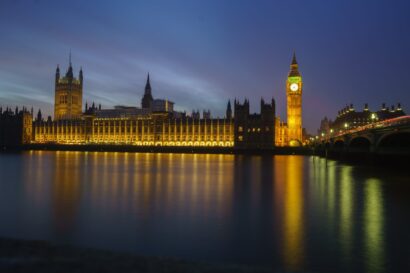PRESS RELEASES | 27/06/2023
Financial regulators key to accelerating the net zero transition

A new report published today by the Aldersgate Group calls on the government to provide a strong legal basis for financial regulators to support the transition to a net zero and nature positive economy. It finds that financial regulators are limited by a narrow mandate on climate and nature, capacity and resource constraints, and a lack of comprehensive net zero-aligned policy across the economy.
This means that financial regulators face major barriers in tackling the build-up of systemic climate and nature-related market stability risks, hampering the important role they have to play in facilitating an orderly transition to net zero. This Aldersgate Group report advocates for a net zero mandate for financial regulators once the implementation of the Net Zero Strategy has progressed across the economy. It launches alongside another espresso briefing outlining clear next steps to decarbonise the UK’s power system, which is available here.
The Bank of England’s Climate Biennial Exploratory Scenario, published May 2022, found that without an early and orderly transition to net zero, climate risks could cause a “persistent and material drag” on the profitability of banks and insurers. Under a no additional action scenario, banks and insurers could face losses of £334 billion by 2050.
Financial regulators have an important role to play in mitigating this systemic risk. Since 2015, regulators have increasingly been embedding environmental considerations into their policymaking. However, further action is needed to minimise business disruption and financial losses from the impacts of climate change.
The Financial Services and Markets Bill, currently progressing through Parliament, has proposed giving financial regulators a remit to consider the UK’s legally binding 2050 net zero target as well as environmental targets as under the Environment Act when discharging their functions. The next government should provide regulators with a stronger legal requirement to facilitate the transition.
James Fotherby, Policy Officer of the Aldersgate Group said: “Tackling climate change and biodiversity loss requires a whole-of-government approach, utilising all the levers and arms available to government. Financial regulators have a crucial role to play in mitigating the build-up of climate and nature-related risks and facilitating the transition to net zero. Over the past few years, we have seen financial regulators starting to use the supervisory and market regulatory tools at their disposal to understand climate risk exposure and improve the availability of climate-related financial information. To build on this, we now need a stronger mandate to mainstream climate and nature within their policy work and more actively facilitate the transition.”
Jess Foulds, ESG Strategy Director at Aviva Investors, said: “The UK needs to capitalise on the green transition by formalising the role financial regulators play in creating the world’s first net zero financial centre. By doing so, the UK financial sector can enjoy the economic advantages from being a global standard setter in globalised financial markets and operate on a level playing field when supporting the UK’s economic transition. We believe that there should be a secondary statutory objective for regulators to facilitate the transition of the financial services sector to net zero.”
Bevis Watts, CEO at Triodos Bank UK, said: “We welcome this report and its recommendations because the pace and scope of the changes needed in the financial sector to address the climate crisis are not well reflected in the current remit of the regulators. We need to see them with broader knowledge, skills and stronger mandates to support the finance sector through a just and nature positive transition. A systemic approach makes sense, with a focus on the role of the regulators within the wider economic and policy context, and we hope to see the joined up thinking presented in this paper reflected in the development of the future Financial Services and Markets Act.”
The report recommends government set out a strategic and sequenced approach to financial regulators:
Implementing the net zero strategy at pace
- It is the role of government to set national net zero plans and drive the whole-of-economy transition using relevant fiscal, regulatory and economic policy levers. Financial regulators must play a complementary role to facilitate the transition with their prudential and market regulatory tools.
- To avoid a scenario where regulators are driving net zero policy or where government policy is insufficient for regulators to intervene, government must first set out a well-designed public policy foundation.
- This foundation must create incentives for investment into net zero infrastructure and nature restoration by closing the gaps in the Net Zero Strategy (2021).
Empower regulators with a stronger and clearer mandate on net zero and nature
- The Financial Services and Markets Bill, currently in Parliament, proposes giving the FCA and the PRA a new regulatory principle to have regard to the need to contribute towards achieving compliance with the UK’s net zero emissions target and environmental targets (as set out in the Climate Change Act 2008 and the Environment Act 2021, respectively)
- Regulatory principles, however, do not provide a sufficiently strong legal basis for regulators to act.
- Once the implementation of the Net Zero Strategy is well underway and strong market signals are in place, the next government should amend the Financial Services and Markets Act 2023 to explicitly include the transition to net zero and nature positive economy as a secondary objective. This will also improve regulator accountability as regulators are required to report their progress against statutory objectives.
- A Joint Commission on Climate Finance Regulation, led by the CCC and Bank of England, should advise the government on when the net zero strategy has been sufficiently developed.
With an enabling mandate, regulators should look to use green prudential tools
- The primary responsibility of financial regulators is to ensure the stability of the financial system. With an enabling mandate, regulators should look to use green prudential instruments to mitigate the systemic risk that climate change and nature loss poses to the financial system. Examples of instruments include:
- Climate-adjusted capital requirements, which requires banks investing in assets which are incompatible with a 1.5C pathway and risk becoming stranded to hold more loss-absorbing liquid capital.
- Large exposure limits, which limit a bank’s overleveraged position in carbon-intensive assets that are at high risk of stranding.
Meanwhile, financial regulators should use existing tools to support the financial sector to engage with systemic climate risk
- As the world gets closer to 2030 climate targets, there is a clear need for near-term action.
- Financial regulators should continue to support companies to manage their environmental risks and achieve genuine emissions cuts across their business operations using their existing tools.
- Financial regulators should oversee the creation and implementation of transition plans prepared by financial institutions and corporates to ensure their credibility. From 2023, UK asset managers, asset owners, and large listed companies will be required to disclose mandatory transition plans on a comply or explain basis.
Support financial regulators overcome capability constraints
- To carry out these new roles and responsibilities, it is crucial that financial regulators are sufficiently staffed and resourced.
- Relevant staff, for example, should be given formal training to ensure they have the right skills (such as accurately assessing climate-related risks and opportunities) to adapt to a changing mandate. This could be delivered through the vehicle of the re-launched Sustainable Finance Education
- Investment in resources and training should commence before the mandate is formally changed, as reskilling takes time and the transition is already underway.
- Separately, the government should also ensure the Treasury Committee has sufficient resources to adequately scrutinise financial regulators on behalf of the UK Parliament.


